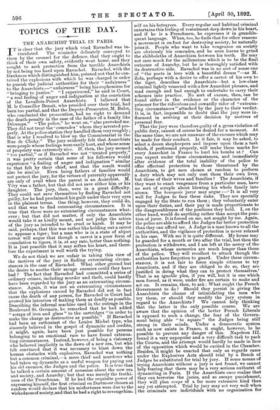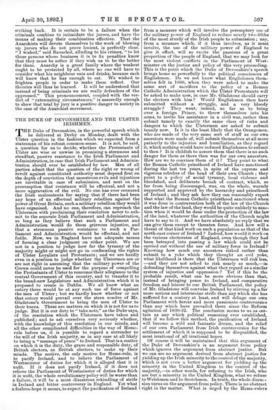TOPICS OF THE DAY.
THE ANARCHIST TRIAL IN PARIS.
IT is clear that the jury which tried Ravachol was in- timidated. The reminder delicately conveyed to them by the counsel for the defence, that they ought to think of their own safety, evidently went home, and they sought to seek protection from the terrible Anarchists by not being too hard upon Ravachol. Ravachol, with the frankness which distinguished him, pointed out that he con- trived the explosions with which he was charged in order to punish the judicial authorities for their " unfairness " to the Anarchists,—" unfairness " being his euphemism for " bringing to justice." " I experienced," he said in Court, " a real feeling of anger and indignation at the conviction of the Levallois-Perret Anarchists. I believed that M. le Conseiller Benoit, who presided over their trial, had been too partial, and that the Deputy-Prosecutor, M. Bulot, who conducted the prosecution, had no right to demand the death-penalty in the case of the father of a family like Decamps." " The police," he went on, " also provoked me. They did not treat the `comrades' whom they arrested pro- perly. At the police-station they handled them very roughly; that is why I resolved to blow up the Commissariat in the Rue de Clichy." The jury evidently felt that Anarchists were people whose feelings were easily hurt, and whose sense of propriety was extremely nice. If, then, the jury seemed " too partial," or if Ravachol was not " treated properly," it was pretty certain that some of his followers would experience "a feeling of anger and indignation" similar to that felt by their chief, and that the result would also be similar. Even being fathers of families would not protect the jury, for the virtues of paternity apparently are only of avail when the parent is an Anarchist. M. Wry was a father, but that did not save either him or his daughter. The jury, then, were in a great difficulty. They could not save themselves by finding Ravachol not guilty, for he had proclaimed his guilt under their very eyes in the plainest terms. One thing, however, they could do, and that was to find extenuating circumstances. It is true that there were no extenuating circumstances what- ever ; but that did not matter, if only the Anarchists would take it as kindly meant, and not judge the action of the jury as intended to be cruel or harsh. It may be said, perhaps, that this was rather like holding out a carrot to appease a tiger; but a man who is in a state of abject terror will argue that though a carrot is a poor form of consolation to tigers, it is, at any rate, better than nothing. It is just possible that it may soften his heart, and there- fore the experiment is well worth the trying.
We do not think we are unfair in taking this view of the motives of the jury in finding extenuating circum- stances in the case of Ravachol. What other ground but the desire to soothe their savage enemies could they have had ? The fact that Ravachol had committed a series of ordinary crimes, including murder and theft, could hardly have been regarded by the jury as an extenuating circum- stance. Again, it was not an extenuating circumstance that the explosions caused by Ravachol did not in fact cause the death of any person, for Ravachol in Court had avowed his intention of making them as deadly as possible. Describing the infernal machine used in the outrage in the Boulevard St. Germain, he remarked that he had added " scraps of iron and glass " to the cartridges " in order to make the charge as destructive as possible." If Ravachol had been an enthusiast of the Louise Michel type, who sincerely believed in the gospel of dynamite and cordite, it might, again, have been just possible for persons belonging to an emotional race to have found extenua- ting circumstances. Instead, however, of being a visionary who believed implicitly in the dawn of a new era, but who felt convinced that it was necessary to blast down the human obstacles with explosives, Ravachol was nothing but a common criminal,—a mere thief and murderer who had taken up dynamite as a useful weapon for paying out his old enemies, the Judges and the police. It is true that he talked a certain amount of nonsense about the new era and society, and Anarchy ; but that was merely the frothi- ness of the Frenchman. If he had the requisite power of expressing himself, the first criminal on Dartmoor chosen at random would declare that his misfortunes were due to the wickedness of society, and that he had a right to revenge him- self on his betrayers. Every regular and habitual criminal entertains this feeling of resentment deep down in his heart, and if he is a Frenchmen, he expresses it in grandilo- quent language. When, too, he finds that for other reasons a movement is on foot for destroying society, he naturally joins it. People who want to take vengeance on society are obviously his comrades, and he soon learns to grind the shibboleths of Anarchism between his teeth. He may not care much for the millennium which is to be the final outcome of Anarchy, but he is thoroughly satisfied with its destructive side. Ravachol was in no sort of sense one of " the poets in love with a beautiful dream "—as M.
Zola, perhaps with a desire to offer a carrot of his own to the tiger, describes the Anarchists—but a low-class criminal lightly veneered with a few Anarchist phrases, and mad enough and bad enough to undertake to carry their schemes into practice. No sort of excuse, then, can be found either in the evidence or the character of the prisoner for the ridiculous and cowardly rider of "extenua- ting circumstances " attached by the jury to their verdict. It is, in fact, impossible to doubt that the jury were in- fluenced in arriving at their decision by motives of personal fear.
That the jury were therefore guilty of a gross violation of public duty, cannot of course be denied for a moment. At the same time, we are not unaware of the excuses which may be made for their conduct. Is it fair, it may be asked, to select a dozen shopkeepers and impose upon them a task which, if performed properly, will make them marks for every Anarchist in France to hurl his bombs at ? Can you expect under these circumstances, and immediately after evidence of the total inability of the police to offer effectual protection to those threatened by the Anarchists, to get men chosen at random to perform a duty which may not only cost them their own lives, but those of their wives and families ? The Anarchists, if they want to exact vengeance from a particular man, have no sort of scruple about blowing his whole family into atoms. The bourgeois juror may argue It is all very well for Judges to face these risks. They are specially engaged by the State to run them ; they voluntarily enter upon their duties, and their pay is made proportionate to the disagreeableness of the positions they hold. I, on the other hand, would do anything rather than accept the posi- tion of juror. It is forced on me, not sought by me. Again, the police are able to afford the Judges far better protection than they can afford me. A Judge is a man known to all the authorities, and the vigilance of protection is never relaxed in his case. With me it is quite different. My house may- be guarded for a month or two after the trial, but then the protection is withdrawn, and I am left at the mercy of the Anarchists, whose memories are much longer than those of the police. They will recollect to attack though the authorities have forgotten to guard. Under these circum- stances, it is not fair to force simple citizens to try Anarchists, and if they are obliged to do so, they are justified in doing what they can to protect themselves.' That is an ignoble plea, if you will, but it is one which men forced, as it were, under fire are certain to make and act on. It remains, then, to ask : What ought the French Government to do ? Should they persist in giving the Anarchists the chance of intimidating the men who try them, or should they modify the jury system in regard to the Anarchists ? We cannot help thinking that the latter is the only possible course. We are aware that the opinion of the better French Liberals is opposed to such a change, the fear of the Govern- ment being able " to square " the Judges being still strong in their minds. Under a democratic system such as now exists in France, it ought, however, to be possible to prevent any danger of this. Napoleon III. found it a very unpopular and a very difficult task to pack the Courts, and the attempt would hardly be made in face of the opposition which would be excited in the Chamber. Besides, it might be enacted that only as regards cases under the Explosives Acts should trial by a Bench of Judges be substituted for trial by jury. If some means of trying Anarchists without a jury is not found, we cannot help fearing that there may be a very serious outburst of dynamiting in Paris. If the Anarchists once realise that they can terrorise the juries, and so escape punishment, they will plan coups of a far more extensive kind than any yet attempted. Trial by jury may act very well when the criminals are individuals with no organisation for striking back. It is certain to be a failure when the criminals combine to intimidate the jurors, and have the means of making their combination effective. That the Anarchists will devote themselves to the work of blowing up jurors who do not prove lenient, is perfectly clear. "I wished," said Ravachol, alluding to his crimes, "to let those persons whose business it is to fix penalties know that they must be softer if they wish us to be the better for them. Anarchy is a great family where the weakest ought to be protected by all, where no one will have to consider what his neighbour eats and drinks, because each will know that he has enough to eat. We wished to frighten people in order to make them reflect. Our theories will thus be learned. It will be understood that instead of being criminals we are really defenders of the oppressed." This pronouncement, coupled with the ver- dict of "extenuating circumstances," is assuredly enough to show that trial by jury is a positive danger to society in the case of the Anarchist movement.



















































 Previous page
Previous page